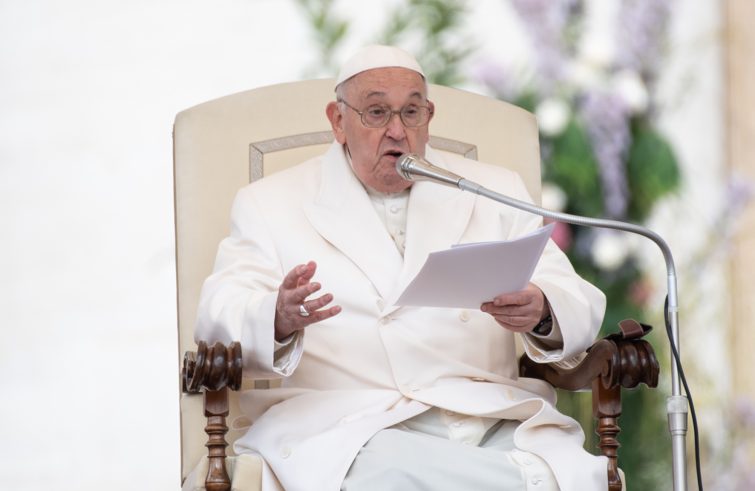
“Our thoughts, at this moment, go to the peoples at war,” Pope Francis said in his remarks at the end of the weekly general audience in Saint Peter’s Square, that focused on the virtue of temperance. “We think of the Holy Land, of Palestine, of Israel. We think of Ukraine, the martyred Ukraine”, Francis said: “We think of the prisoners of war: May the Lord move wills so they may all be freed.” “And speaking of prisoners,” continued the Holy Father speaking off-text, “my thoughts go to those who are tortured.”
“The torture of prisoners is a horrible thing: it is not human.
Our thoughts go to so many kinds of torture that wound the dignity of the human person, and of so many tortured people. May the Lord help everyone and bless everyone.”
“People without temperance are unreliable, always”,
the Pope said in the opening lines of his catechesis on the fourth cardinal virtue, “the virtue of right measure”, which, “in all circumstances, acts wisely, for those who are driven by their impetus or exuberance are inherently unreliable.” Francis reminded the faithful that in Greek, as cited by Aristotle, temperance is ‘enkráteia’, which translates literally as “power over oneself”, understood as “the capacity for self-mastery, the art of not letting oneself be overcome by rebellious passions, to bring order to what Manzoni referred to as the ‘jumble of the human heart’.”
“In a world where so many people claim to speak their mind, the temperate person prefers to think before uttering words,” the Pope observed.
“The temperate person does not say whatever comes to mind, but rather thinks about what they have to say, they do not make empty promises, but rather take on commitments they can realistically meet.” “The temperate person” Pope Francis said, “knows how to weigh words and dose them well: he thinks what he says. He does not allow a moment’s anger to ruin relationships and friendships that can then only be rebuilt with difficulty, especially, in family life, where inhibitions are lower, we all run the risk of not keeping tensions, irritations and anger in check. There is a time to speak and a time to be silent. Both require the right measure. This applies to many things, for example, being with others and being alone.”
“Faced with pleasures, the Pope said the temperate person acts judiciously”,
the Pope said. “The free flow of drives and the total licence granted to pleasure end up backfiring on us, plunging us into a state of boredom,” the Pope denounced:
“How many people who have wanted to try everything voraciously have found themselves losing the taste for everything! It is better then to seek the right measure. For example, in order to appreciate a good wine, savouring it in small sips is preferable than drinking it all at once.”
“The temperate person can control their own irascibility”, Francis said, although “this does not mean we always find him with a peaceful and smiling face”, remarked the Holy Father, for whom “at times it is necessary to be indignant, but always in the right way.” “A word of rebuke is at times healthier than a sour, rancorous silence. The temperate person knows that nothing is more uncomfortable than correcting another person, but he also knows that it is necessary. Otherwise, he would leave the door open to evil. In certain cases, the temperate person succeeds in holding extremes together, he affirms absolute principles, asserts non-negotiable values, but also knows how to understand people and shows empathy for them.”
“The gift of the temperate person is being balanced, which is precious and rare”,
Francis said in concluding lines of his catechesis. “When everything in our world pushes to excess, temperance combines well with Gospel values such as smallness, discretion, modesty, meekness”, the Pope remarked. “The temperate person appreciates others people’s esteem, though he doesn’t make it the sole criterion for his actions and words. He is sensitive and knows how to weep. When he falls, he gets back up, and when victorious, he returns to his humble life. He does not seek applause, but he is aware of his need for others.” “Temperance does not make one grey and joyless. On the contrary, it lets one better enjoy the good things in life: gathering around the dinner table, the tenderness of certain friendships, the friendship with wise people, the wonder at the beauty of Creation. Happiness with temperance is joy that blossoms in the heart of those who recognise and value what matters most in life. Let us pray to the Lord to give us this gift: the gift of maturity, the maturity of age, the gift of emotional and social maturity.”












